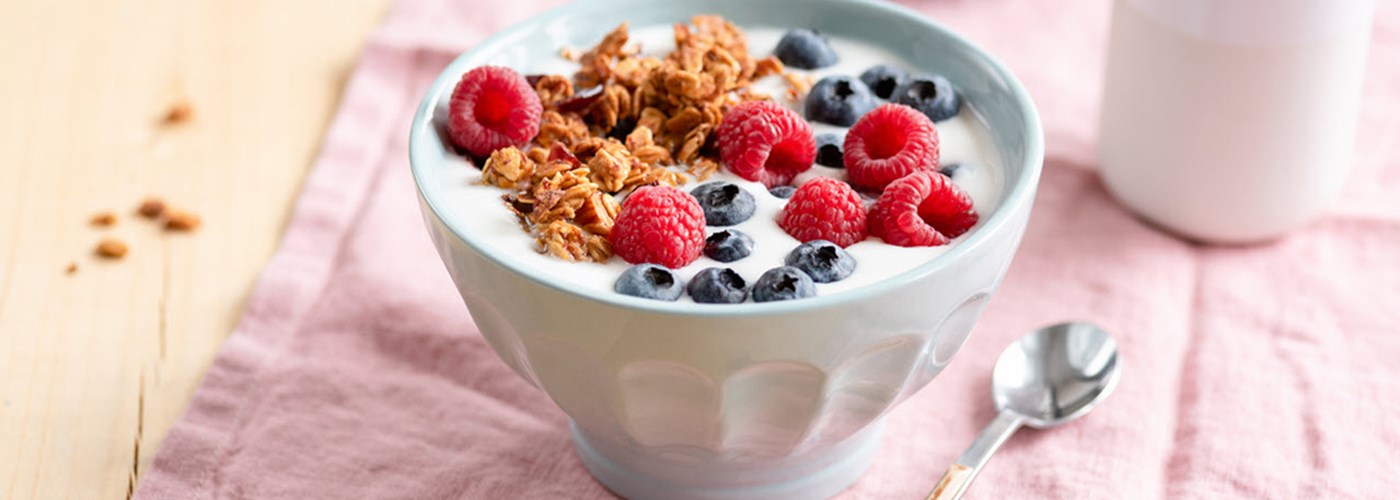15 Foods For Good Gut Health
Last reviewed: March 2025
Estimated Reading Time: 4 Mins
Dairy products | Fermented foods | Fruit & Vegetables | Fats and Oils
With so much conflicting information online, it can be challenging to determine which foods truly support a healthy gut.
This article simplifies the confusion, offering clear guidance on the best health foods to promote digestion and overall well-being.
Food should be varied, colourful and high in fibre however, remember that portion sizes should always be in the right proportions for your energy expenditure and should be eaten at regular intervals throughout the day ideally three meals a day.
So here’s our guide to best foods for gut health. In no particular order, here's some tasty and unusual foods that are also good for your insides.
Dairy Products
Dairy products can support gut health by providing probiotics—beneficial bacteria that help balance the gut microbiome, improve digestion, and enhance overall gut function.
Kefir
This probiotic yoghurt drink is made by fermenting milk and is packed with good bacteria (which can help to reduce a leaky gut). It originated in the mountainous region between Asia and Europe, as well as Russia and Central Asia. It also makes a great addition to smoothies and soups, or you can use it as a base for salad dressing (add lemon juice and seasoning).

Kefir, a great probiotic
Yogurt
Live yoghurt is an excellent source of so-called friendly bacteria, also known as probiotics. Look out for sugar-free, full-fat versions and add your own fruit for a tasty breakfast. Yoghurt drinks can contain high numbers of bacteria that are good for the gut, far more than you would find in a normal yoghurt. Do be mindful though as they can have a high sugar content.
Roquefort cheese
Live, runny, smelly French cheese* will give your gut bacteria a boost – but eat it in moderation. Add it to salads or spread it on your sourdough. Whilst we cannot be ensured that all of the bacteria survive digestion to be beneficial it is believed that other properties help preserve some bacteria during digestion.
Fermented foods
Fermented foods support gut health by supplying probiotics and beneficial enzymes that enhance digestion, strengthen the gut microbiome, and promote overall digestive balance.
Sauerkraut
This is finely chopped cabbage that has been fermented. This great source of probiotics, fibre and vitamins is best known as a German dish, but versions exist in Eastern and Central Europe. Choose a product that has not been pickled in vinegar, as that doesn’t have the same benefits. It’s delicious served with sausages, and can be cheap and easy to make at home.
Kimchi
This Korean speciality of fermented vegetables brings the benefits of probiotic bacteria along with vitamins and fibre. Use it as a lively side dish with meat, salad or eggs. It’s so popular that Koreans say “kimchi” in the same way that we say “cheese” when they have their photos taken.

Kimchi, the national food of Korea
Miso
Miso is made from fermented soya beans, plus barley or rice, and contains a range of goodies such as helpful bacteria and enzymes. A savoury paste used in dips, dressings and soup, it can also be used as a marinade for salmon or tofu. It’s a staple of Japanese cooking and suitable if you’re avoiding dairy. There is uncertainty within the research that the bacteria effectively reach the gut, nevertheless in regions where Miso is a staple fermented food source the population have better gut health and less bowel disease.
Kombucha
We all know water is crucial for gut health, but what else can you drink? Kombucha is a fermented tea drink thought to have originated in Manchuria that is full of probiotic good bacteria. It has a sharp, vinegary taste and can be used as a refreshing drink on its own or mixed with fruit and spices. It also makes the base for great cocktails.
Fruit & Vegetables
Fruit and vegetables support gut health by providing fibre, which feeds beneficial gut bacteria, promotes healthy digestion, and helps maintain a balanced gut microbiome.
Bananas
One of nature’s handiest and healthiest snacks, bananas are full of the kind of fibre that good bacteria enjoy. They also contain healthy minerals.
Peas
Gut bacteria need fibre to flourish, so the more fruit and vegetables you consume the better. Peas are full of soluble and insoluble fibre to help keep your system in balance. Add peas to stir-fries, soups or salads.
Brussels sprouts
Much more than a festive staple, they contain the kinds of fibre that good bacteria like and sulphur compounds which help combat unhealthy bacteria such as H pylori. Stir-fry with garlic and bacon for a delicious side dish.
Ginger
Fresh ginger can help in the production of stomach acid and it stimulates the digestive system to keep food moving through the gut. Add fresh grated ginger to soups, stews, smoothies or stir-fries. Pour boiling water on grated ginger to make refreshing ginger tea.

Ginger is not only flavourful but good for digestion too
Garlic
Garlic, with its antibacterial and antifungal properties, can help keep “bad” gut bacteria under control and help balance yeast in the gut. Use it as a flavouring for savoury dishes. The properties within garlic act as a fuel source to allow the bacteria to do their job better which overall improves gut function and can help heal your gut.
Fats and oils
Olive oil
Gut bacteria and gut microbes like a diet of fatty acids and polyphenols. These are found in olive oil. Studies have shown that it helps reduce gut inflammation. Use it for salad dressing or drizzle it over cooked vegetables. Some studies have also found olive oil to be beneficial in easing indigestion problems and can also benefit your pancreas through lowering its requirement to produce digestive enzymes.

Olive oil can enhance the texture and taste of your salads
Almonds
These have good probiotic properties, which means they are a treat for your gut bacteria – high in fibre, and full of fatty acids and polyphenols. A handful of almonds makes an excellent snack when you’re feeling peckish.
* Live runny cheeses are best avoided during pregnancy
NOTE: Altering your diet suddenly may cause changes in bowel habits or other symptoms.
About our healthcare
Benenden Health provides affordable private healthcare for everyone, giving you access to services such as our 24/7 GP Helpline and Mental Health Helpline straight away. Once you’ve been a member for six months you can request access to diagnostic consultations and tests.
You'll also have access to a wealth of health and wellbeing articles, videos and advice on a range of health issues.

Wellbeing tips straight to your inbox
We'll share tips on healthy eating, ways to improve your mental health, along with easy to digest information on common health conditions.
If you’re an existing Benenden Health member please login to My Benenden to update your email preferences. This will ensure you receive our exclusive monthly newsletter.
Medically reviewed in April 2024.


